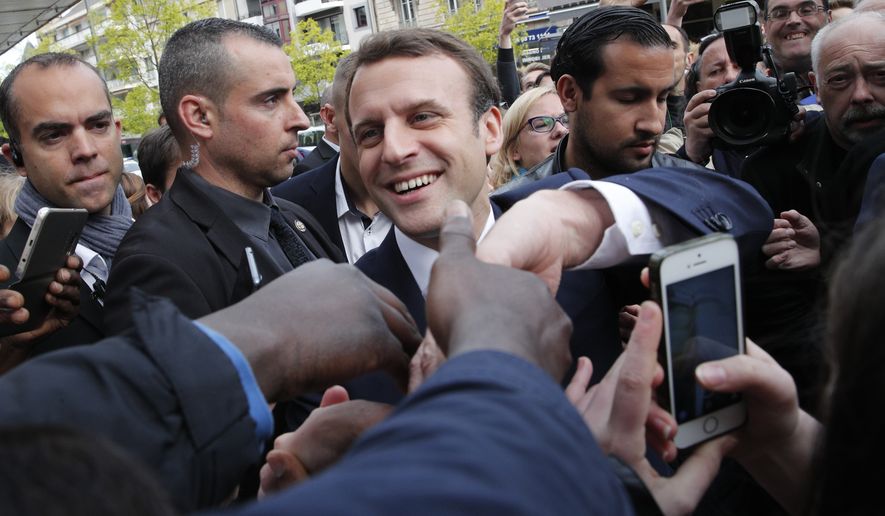Hackers disrupted the French presidential election Friday by releasing thousands of documents purportedly stolen from the campaign of centrist frontrunner Emmanuel Macron two days before voters are poised to pick the nation’s next leader.
Nine gigabytes of data allegedly acquired from the Macron campaign first appeared Friday on the website Pastebin before spreading virally ahead of Sunday’s presidential election.
The Macron campaign acknowledged it was recently subjected to a “massive and coordinated” cyberattack Friday, invoking comparisons to the hacking campaign that sidelined Democratic candidate Hillary Clinton’s presidential ambitions during last year’s White House race.
“Intervening in the last hour of the official campaign, this operation is obviously a democratic destabilization, as has already been seen in the United States during the last presidential campaign,” the Macron campaign said Friday.
Unlike the operation endured by Mrs. Clinton’s campaign widely blamed on Russian hackers, however, the individuals responsible for targeting the Macron camp elected to release stolen correspondence two days before France picks its president, giving voters a fairly limited timetable to review his campaign’s internal correspondence before the polls open.
French campaign laws prohibit candidates from speaking to the media the day before and during presidential elections, effectively barring Mr. Macron or his opponent, far-right populist and National Front leader Marine Le Pen, from commenting on the leak until the election has ended.
France’s election commission separately issued its statement discouraging individuals from spreading the leaked data, urging social media users and journalists alike “not to pass on this content, so as not to distort the sincerity of the ballot.”
What’s more, Le Monde, a prominent French newspaper, said it wouldn’t cover the leaks’ contents before Sunday’s election. “If these documents contain revelations,” however, then “Le Monde will of course publish them after having investigated them, respecting our journalistic and ethical rules and without allowing ourselves to be exploited by the publishing calendar of anonymous actors,” it said Saturday.
The U.S. government concluded in January that Russia’s military intelligence agency, GRU, used state-sponsored hackers to steal documents connected to Mrs. Clinton’s campaign and then leaked them prior to Election Day in a bid to disrupt her odds of defeating the race’s eventual winner, President Trump.
France’s National Cybersecurity Agency admitted two months later that its own election process faces “an extremely high risk” of being hacked, and U.S. cybersecurity firm Trend Micro said in April it found evidence linking GRU hackers to a similar effort targeting Mr. Macron’s campaign. Russia denied responsibility at the time, and the Macron camp said the attempted intrusion was unsuccessful.
In Friday’s statement, however, the Macron campaign acknowledged that authentic documents had been stolen and were circulating alongside, the likes of which it said were being shared with bogus files in order “to sow doubt and misinformation.”
Regardless of their origin, Robert Graham, the founder of Errata Security, noted Friday that most recent emails purportedly stolen from the Macron camp and leaked online are dated April 24 — the same date cybersecurity firm Trend Micro announced that Russian hackers may have attempted to infiltrate the politician’s campaign.
“Obviously, everyone assumes that Russian hackers did it, but there’s nothing (so far) that points to anybody in particular,” Mr. Graham wrote Friday with regards to the Macron leak. “It appears to be the most basic of phishing attacks, which means anyone could’ve done it, including your neighbor’s pimply faced teenager.”
The hacking of Mr. Macron’s email has prompted concern from legislators in the United States.
“While we are still awaiting confirmation from French officials that there are indeed forgeries being dumped along with authentic stolen documents, this would represent yet another dangerous escalation of cyber interference in a Western nation’s democracy,” Rep. Adam Schiff of California, the top Democrat on the Senate Foreign Intelligence Committee, said in a statement issued Saturday.
• Andrew Blake can be reached at ablake@washingtontimes.com.




Please read our comment policy before commenting.